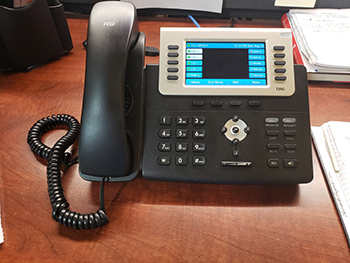 Most technologies get faster, better, and cheaper as time passes. Remember when a basic PC could set you back $3000-$4000? Thirty-five years later, a $200 smartphone has far more power, speed, and capabilities than that old green-screen monochrome desktop boat-anchor with floppy drives.
Most technologies get faster, better, and cheaper as time passes. Remember when a basic PC could set you back $3000-$4000? Thirty-five years later, a $200 smartphone has far more power, speed, and capabilities than that old green-screen monochrome desktop boat-anchor with floppy drives.
But what about your business phone service? Has it experienced a similar increase in power and performance, and decrease in cost? Or are you still paying the phone company the same price (sometimes more) for the same service that you did 35 years ago?
[quotes]Not too long ago, there weren’t options to the phone company.[/quotes] You needed a phone, you went into the phone company’s office, ordered the number of lines you needed (or more likely, the number you could afford).
If you needed two or more lines and multiple extensions, you needed a complete phone system with expensive handsets and wiring. If you had more than one location, you had to duplicate this process for each site.
You could only handle as many calls as you had lines from the phone company, and how many your phone equipment supported. If you needed to handle more calls, you had to order more lines from the phone company and have your phone vendor upgrade your equipment and program it – an expensive and time-consuming process. And you still had to pay a large chunk of money monthly to the phone company.
If you had multiple locations, especially in different cities or states, you had to deal with multiple companies to provide the service and keep up with multiple bills.
Good News: Business Telephone Services Have Changed Immensely
 If you have at least 5 Mbps (upload vs download) internet service at your location(s), you can take advantage of the advances in voice communications technology and reduced cost of service and management.
If you have at least 5 Mbps (upload vs download) internet service at your location(s), you can take advantage of the advances in voice communications technology and reduced cost of service and management.
New voice technologies are not all that new; they have been around since the early to mid-2000s and are quite mature platforms and services.
Communications services can be all hardware, all software, or more likely, a combination of both. Service is not limited to just your local telephone monopoly company that has the franchise rights to your location, there are many providers available to choose from with many different plan options. If you have more than one location, you can choose one or several different providers to service all of your locations.
You can have employees work from home and answer/make calls just the same as if they were in your office. [quotesright]In a nutshell, the features and options (and savings) once only available to the largest corporations and government entities are now available to all. [/quotesright]
How Do I Get These Features and Benefits?
A common name for systems that provide these services is “PBX”. PBX stands for “Private Branch Exchange,” which is a private telephone network used within a company or organization.
The users of the PBX phone system can communicate internally (within their company) and externally (with the outside world), using a mix of different communication channels like Voice over IP (VoIP), T1, or analog lines.
An internet PBX is one that uses the internet and your existing network cabling (or Wi-Fi) to provide service, either from a service provider (PaaS; “Platform as a Service”) or on your own purchased/leased system.
Here are examples of how an internet PBX/PaaS can be easily implemented in different sized companies:
- A small “virtual” business without a physical location with multiple employees working from home can use either a PaaS provider or buy/lease a custom internet PBX. Each employee can have either a desktop phone or use a browser-based softphone with a wired or wireless headset.
All outbound calls will show as dialed from the business (no more using employee landlines/cellphones), which means that customers are not aware that your employees are working from home. (Unless the dog is barking, the kids are fighting, etc. – that’s beyond the scope of technology to fix!)
- A retail operation or business office would like to modernize their phone system but are not able to get sufficient internet access to support voice calls, or due to their location, cannot “port” (i.e., transfer their service) from their existing phone company to another carrier (this occurs a lot in rural areas).
Although the PaaS option would not work, a custom internet PBX would. The PBX can be based on-site and utilize a gateway to convert the existing telephone lines/T1 into a form the PBX could utilize. Then, when better options for internet service or the ability to move the phone numbers become available, the system will be able to utilize the higher speed access or flexibility with minimal changes so the company doesn’t waste the investment already made.
- Businesses with multiple locations such as a pizza delivery chain or a corporation with multiple offices in several states can utilize a custom internet-based PBX to provide services to all locations from one system.
The branches and individual stores need only minimal equipment and internet access, and all of them can share one or multiple SIP-trunks (“Session Initiated Protocol” - i.e., the modern digital equivalent to your old telephone company phone lines) which can provide savings by buying in bulk. [quotesright]No need to buy phone service in each location or obtain/maintain multiple phone systems. [/quotesright]
- A larger company with multiple offices, warehouses, production floor, or outside work areas can implement a custom internet PBX that provide call queues for sales and customer service with integration to popular customer relationship management software (CRM), paging system for warehouse/production areas and outside work areas, wireless ruggedized phones, and integration with access control systems.
There are many factors to consider when choosing to switch to a PaaS/internet PBX solution:
- Do all locations that need service have (or can acquire) sufficient internet bandwidth?
- How many people need a phone/extension?
- How many calls are made/received on a daily basis? Ask the existing provider for a “CDR” (call detail record) to determine the number of calls and more importantly, how many minutes.
- Are faxes utilized in the business? The number of inbound vs outbound?
- Are additional features needed? Warehouse paging? Cordless handsets? Door intercoms? Conference/meeting room phone? Integration with company software?
These are just a few of the important questions to be considered that a professional communications systems consultant and integrator can help you answer and make informed choices.
Your consultant/integrator can help you determine whether subscribing to a PaaS provider would meet your needs or whether choosing to buy/lease a customer internet PBX phone system would be more suitable.
-courtesy FlexServe Computer Services, LLC